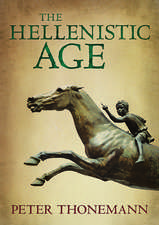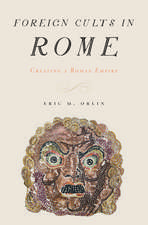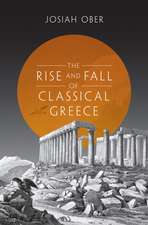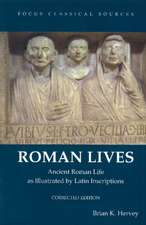Device and Composition in the Greek Epic Cycle
Autor Benjamin Sammonsen Limba Engleză Hardback – 24 aug 2017
Preț: 575.42 lei
Preț vechi: 824.89 lei
-30% Nou
Puncte Express: 863
Preț estimativ în valută:
110.12€ • 114.54$ • 90.91£
110.12€ • 114.54$ • 90.91£
Carte tipărită la comandă
Livrare economică 03-09 aprilie
Preluare comenzi: 021 569.72.76
Specificații
ISBN-13: 9780190614843
ISBN-10: 0190614846
Pagini: 272
Dimensiuni: 239 x 163 x 20 mm
Greutate: 0.54 kg
Editura: Oxford University Press
Colecția OUP USA
Locul publicării:New York, United States
ISBN-10: 0190614846
Pagini: 272
Dimensiuni: 239 x 163 x 20 mm
Greutate: 0.54 kg
Editura: Oxford University Press
Colecția OUP USA
Locul publicării:New York, United States
Recenzii
Martin West once criticised a book on early Greek Epic as 'unimaginative' (CR21 (1971) 69) while containing 'speculations hardly worth writing down'. The adjective could never be used of this book, which indeed, in at least one reader, inspired musings on the very meaning of that word and its place in classical studies.
Sammons has succeeded admirably in recovering those poems as works of art.
Brilliant in execution, his demonstration of these two points makes these poems come alive. S. brings them out of the shadows cast by the Homeric epics and, put simply, makes them sound good. His analysis imparts a greater degree of cohesion and coherence to the poems than previous investigations have detected. One comes away from this book wishing that they had survived ... This book will guide scholars of ancient Greek epic for years to come. Moreover, written by a practiced stylist, it will be accessible to graduate students and advanced undergraduates. One will give it pride of place in a course on ancient Greek epic broadly construed.
[Sammon's] study, even when dealing with problematic issues, proves to be an invaluable tool for students and scholars alike. Despite the problems posed by the fragmentary nature of his material, S. succeeds in doing justice to the cyclic poets by identifying and bringing to the surface the narrative and structural devices employed in their composition, while steering away from speculative reconstructions of the poems. S.'s innovative study has opened the way for a positive revaluation of the Greek Epic Cycle, and no further study of the subject can afford not to take his contribution into account.
Summing Up: Recommended. Upper-division undergraduates through faculty.
Sammons has succeeded admirably in recovering those poems as works of art.
Brilliant in execution, his demonstration of these two points makes these poems come alive. S. brings them out of the shadows cast by the Homeric epics and, put simply, makes them sound good. His analysis imparts a greater degree of cohesion and coherence to the poems than previous investigations have detected. One comes away from this book wishing that they had survived ... This book will guide scholars of ancient Greek epic for years to come. Moreover, written by a practiced stylist, it will be accessible to graduate students and advanced undergraduates. One will give it pride of place in a course on ancient Greek epic broadly construed.
[Sammon's] study, even when dealing with problematic issues, proves to be an invaluable tool for students and scholars alike. Despite the problems posed by the fragmentary nature of his material, S. succeeds in doing justice to the cyclic poets by identifying and bringing to the surface the narrative and structural devices employed in their composition, while steering away from speculative reconstructions of the poems. S.'s innovative study has opened the way for a positive revaluation of the Greek Epic Cycle, and no further study of the subject can afford not to take his contribution into account.
Summing Up: Recommended. Upper-division undergraduates through faculty.
Notă biografică
Benjamin Sammons has published widely on ancient Greek literature and teaches at Queens College in the City University of New York.
















